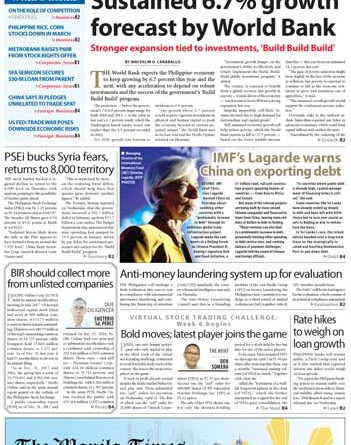ECONOMY-FINANCE: MANILA – Sustained 6.7% growth forecast by World Bank By Business Times – Friday, April 13, 2018
Stronger expansion tied to investments, ‘Build Build Build’
The World Bank expects the Philippine economy to keep growing by 6.7 percent this year and the next, with any acceleration to depend on robust investments and the success of the government’s ‘Build Build Build’ program.
The projection — below the government’s 7.0-8.0 percent target range for both 2018 and 2019 — is the same as last year’s 6.7 percent result, which the Washington-based lender noted was weaker than the 6.9 percent recorded in 2016.
For 2020, growth was forecast to moderate to 6.6 percent.
“Any growth above 6.7 percent would require vigorous investment in physical and human capital to push the economy beyond its current potential output,” the World Bank said in its East Asia and the Pacific Update released on Thursday.
“Investment growth hinges on the government’s ability to effectively and timely implement the Build, Build, Build public investment program,” it added.
The country is expected to benefit from a global recovery but growth in exports — a main driver of the economy — was forecast to level off from a strong expansion last year.
Imports, meanwhile, will likely “remain elevated due to high demand for intermediate and capital goods”.
Still, sustained economic growth will help reduce poverty, which the World Bank expects to fall to 22.9 percent — based on the lower middle-income class line — this year from an estimated 24.2 percent last year.
“The pace of poverty reduction might drop slightly in the face of the increase in inflation, but poverty is expected to continue to fall as the economy continues to grow and transition out of agriculture,” it said.
“The sustained overall growth would support the continuous poverty reduction.”
Downside risks to the outlook include faster-than-expected rate hikes in advanced economies, which could limit capital inflows and weaken the peso.
“Exacerbated by the widening of the current account deficit, the effect of a weaker peso can pass through higher domestic prices, and increase inflationary pressure at a time when global commodity prices are rising,” the World Bank noted.
The Bangko Sentral ng Pilipinas, it said, will have to be on watch for signs of overheating and respond by adjusting its currently accommodative monetary policy stance.
Medium-term prospects, meanwhile, depend on continued growth in both public and private investments, which again will depend in part on the government’s public spending program.
Authorities will have to be mindful of rising deficits and financing costs amid a pick-up in government expenditures, the World Bank warned, given tighter global financing conditions.
Ongoing tax reforms could ease the funding challenge, it noted.
The World Bank also called for structural policies that support investment and trade if productivity and growth were to accelerate. This will require the government’s commitment to promote competition, secure property rights, cut red tape and improve doing business in the country.
“The country’s most pressing challenge remains the delivery of inclusive growth, sustained investment in physical infrastructure and human capital such as in education, skills and health, [which]are important to create quality employment especially among the poor,” the World Bank said. / Business Times BY MAYVELIN U. CARABALLO, TMT ON All photographs, news, editorials, opinions, information, data, others have been taken from the Internet ..aseanews.net | [email protected] | For comments, Email to : Pahulu Gan – Contributor | [email protected]









